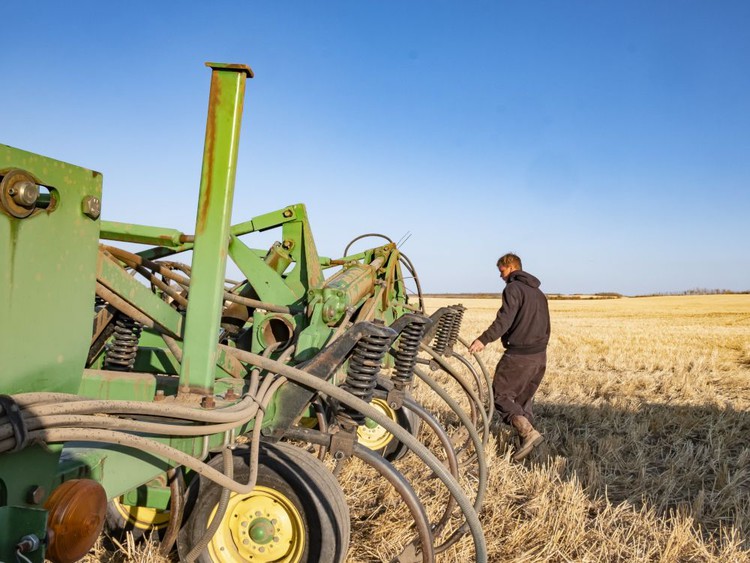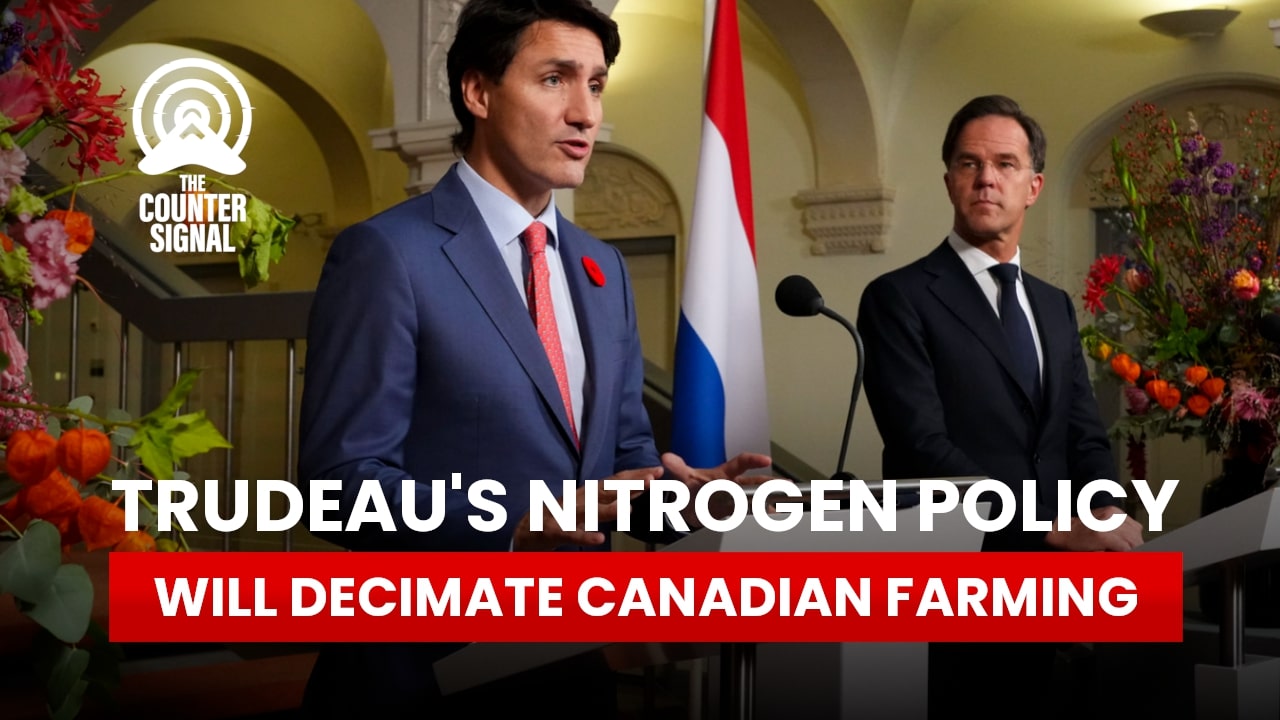Trudeau’s nitrogen policy will decimate Canadian farming
- Thread starter B00Mer
- Start date
You are using an out of date browser. It may not display this or other websites correctly.
You should upgrade or use an alternative browser.
You should upgrade or use an alternative browser.
The whole idea of the WEF is to make sure people have to rely on government to provide the basic necessities. That is what they want to implement and they're succeeding, slowly and have no intention of changing course. Just look up what the WEF stands for and who is on board with their policies and you'll quickly realize that what they have planned for us is not good by any stretch.If there’s one thing that can be said about the Liberals, it’s that when they put their minds to something, there’s virtually nothing that can stop them.
Unfortunately, the Trudeau government has been almost singularly focused on its crusade against climate change, even at the expense of the well-being of Canadians and our geopolitical interests. Its decision to force farmers to reduce fertilizer use at a time of high inflation and increasing food insecurity is another example of a government that turns a blind eye to the human and economic costs of its climate policies.
View attachment 14994
Rising inflation coupled with shortages of numerous commodities are causing very real problems, at home and abroad. In June, Statistics Canada reported that the cost of food had risen 8.8 per cent in the previous year.
View attachment 14993
Instead of addressing that problem, however, the government of Prime Minister Justin Trudeau is ploughing ahead with its plan to reduce emissions of nitrous oxide, a byproduct of nitrogen-based fertilizers, by 30 per cent over the next eight years. This became a flashpoint late last week following a meeting of federal and provincial agriculture ministers in Saskatoon, and anger has been growing since.

NP View: Trudeau ploughs ahead with fertilizer cut, while turning a blind eye to human suffering — National Post
The Liberals' decision to force farmers to reduce fertilizer use at a time of high inflation and increasing food insecurity is another example of a government that turns a blind eye to the human and economic costs of its climate policiesapple.news
According to the Government of Saskatchewan, the provinces had to push to get the fertilizer issue onto the agenda, only to find out that the target had already been set.”The Trudeau government has apparently moved on from their attack on the oil and gas industry and set their sights on Saskatchewan farmers,” said Saskatchewan Agriculture Minister David Marit.
Farm industry groups say there’s simply no viable way to reduce nitrous oxide emissions without reducing the use of fertilizers, which will lower crop yields.
View attachment 14989
As Gunter Jochum, president of Western Canadian Wheat Growers, pointed out, “Farmers don’t need the government to tell them how to properly use fertilizer.” Yet they are the ones who will be footing the bill: according to an independent study from MNP, the policy will cost Canadian farmers over $48 billion in lost revenue from Canola, corn and wheat sales over the next eight years.
View attachment 14995
Along with the development of high-yield crops and effective pesticides, the use of industrial fertilizers can be credited with the world’s ability to feed more people than ever. Over the past 70 years, the global population increased 204 per cent, yet modern farming techniques, including the use of fertilizers, has allowed the per capita calorie supply, the average daily quantity of food energy available to a population, to increase practically everywhere.
View attachment 14990
In Canada, for example, the daily calorie supply increased 25 per cent between 1961 and 2018. Over the same period, wheat yields increased by 329 per cent; corn yields went up 112 per cent; and potato production rose 168 per cent.
This is nothing less than a modern miracle of human ingenuity that has improved the well-being of people around the globe. Yet it’s also the target of Trudeau’s disastrous climate policies, which will affect Canada’s ability to feed its citizens, and the world.
An example of how important Canada is to global agriculture supply chains can be seen in France, where many grocery store shelves once filled with Dijon mustard, a kitchen staple in that country, are now bare — a result of lower Canadian harvests due to fewer mustard crops having been planted last year, combined with severe summer droughts on the Prairies.
View attachment 14996
No one is going to go hungry for lack of mustard, but it goes to show how easily food supplies can be disrupted — along with the myriad of issues farmers face, without having to worry about onerous new government regulations hampering their ability to grow crops.
As the fifth-largest exporter of food, with exports totalling over $82 billion last year, the importance of Canada as the breadbasket of the world cannot be overstated. Nor can the agriculture and agri-food sector’s contribution to the Canadian economy: in 2021, it supported 2.1 million jobs and constituted 6.8 per cent of GDP.
Unfortunately, it’s all too easy to see what the Liberals, and their New Democratic partners, will do once the fertilizer cuts start affecting farmers’ bottom lines and driving the price of groceries even higher. The NDP is already calling on the government to double the GST tax credit and increase the Canada Child Benefit to help lower-income Canadians put food on their tables.
View attachment 14991
Meanwhile, Canadian agricultural producers received over $5.7 billion in government subsidies last year. And then there’s the supply management system, which protects dairy, poultry and egg producers from domestic and foreign competition, ensuring their prices remain high and adding hundreds of dollars to the average Canadian family’s annual grocery bill.
View attachment 14988
Forcing farmers to reduce their fertilizer use will only increase the pressure on governments to offer more financial support, at taxpayers’ expense. This is the exact opposite of what’s needed at the moment.
Instead of being limited by government regulation, farmers should be encouraged to find ways to increase output in order to meet global demand, especially in the face of looming shortages. The supply management system should also be phased out, in order to bring down the cost of Canadian staples and allow our dairy, poultry and egg farmers increased access to foreign markets.
Yet none of these solutions will be possible, so long as the Trudeau Liberals are singularly focused on the climate issue, which, while certainly a pressing longer-term international problem, should not come at the expense of human lives and well-being in the here and now.
View attachment 14992
Trudeau’s nitrogen policy will decimate Canadian farming
View attachment 14728

Trudeau's nitrogen policy will decimate Canadian farming - The Counter Signal
Much like in the Netherlands, Justin Trudeau is bringing in a nitrogen emissions cap that will absolutely decimate Canadian farming.thecountersignal.com
It's all just part of another program and agenda by the WEF globalist communists to try and starve us all to death. The cabal globalists want at least half of the world's population gone by 2030. Covid 19 was the start of it all. The turd is just a part of the globalists plan to starve as many Canadians as the Marxist can. Half of the liberal cabinet are all children of the globalist elite. They want you and me out of here as we are only seen as useless eaters and air breathers. Believe it or not.
Nitrogen is not a greenhouse gas.
Marxist Turdeau is a greenhouse gas. Every time he opens is commie mouth he is spreading greenhouse bullshit.
The whole idea of the WEF is to make sure people have to rely on government to provide the basic necessities. That is what they want to implement and they're succeeding, slowly and have no intention of changing course. Just look up what the WEF stands for and who is on board with their policies and you'll quickly realize that what they have planned for us is not good by any stretch.
Communism is starting to become well entrenched in Canada thanks to this WEF Marxist globalist dicktator in Ottawa. The eventual goal of the globalist cabal is for we the peasants to be chipped and to be able to introduce digital currency. What a great start for the government to start freezing people's bank accounts.
Do not agree with their WEF globalist program and agenda then they will deny ones access to their bank accounts. The turd already started that precedent for doing so in Canada recently. This is not a game anymore. This is starting to become very serious shit going here now. And this Marxist dicktator in Ottawa has three more years to turn Canada into a communist globalist country. Believe it or not.
No leaders .
It's sad to say but this western separation bullshit has been going on for several decades. The west will never separate at all. Why? Because most westerners are just too lazy and too stupid to ever want to separate. They love their royal Ottawa shafting every day that they get from the Marxist liberals in Ottawa and Quebec. Now I just read that there is another kind of Alberta western separatist party just formed. When will these separatist buffoons ever give up? They just go on and on like the Eveready bunny wabbit. They should all just pull the batteries out of their separatist bunny wabbit and go FO. Just saying.
Not many people are interested in government bunk. Colorado is doing quite nice with their weed sales.
Not many people are interested in government bunk. Colorado is doing quite nice with their weed sales.
Keep the dummies on weed and playing XBOX and they will be happy forever. No one can say that our politicians are stupid. They know as to just how to keep their brain dead citizen's happy. Feed them bullshit all day long. Sugar coat it so it looks good.
Dude, we have been smoking weed for over 50 years. This includes some of the richest people in the world.Keep the dummies on weed and playing XBOX and they will be happy forever. No one can say that our politicians are stupid. They know as to just how to keep their brain dead citizen's happy. Feed them bullshit all day long. Sugar coat it so it looks good.
Yehaww.......I'm rich....1/3 of my property is swamp.Buy swamp land. I'll actually be worth something soon.
Not me. The people I know that smoke pot everyday just can’t seem the get their lives together and blame everyone but themselves.Dude, we have been smoking weed for over 50 years. This includes some of the richest people in the world.
Tarp it over and sell the methane.Yehaww.......I'm rich....1/3 of my property is swamp.
Do only pot smokers end there ?Not me. The people I know that smoke pot everyday just can’t seem the get their lives together and blame everyone but themselves.
Funny, I've noticed the same tendency among the daily drinkers.Not me. The people I know that smoke pot everyday just can’t seem the get their lives together and blame everyone but themselves.
The original version of that is the Pope and the Queen. The Queen says "Watch, I can make every Englishperson in the crowd go mad with joy with one little movement of my hand." She waves, and half the crowd goes nuts. The Pope says "I can make every Irishperson in the world go mad with joy with one little movement of my hand," and slaps her.
Them too....Good thing I have no bad habits, eh?.....lolFunny, I've noticed the same tendency among the daily drinkers.
The original version of that is the Pope and the Queen. The Queen says "Watch, I can make every Englishperson in the crowd go mad with joy with one little movement of my hand." She waves, and half the crowd goes nuts. The Pope says "I can make every Irishperson in the world go mad with joy with one little movement of my hand," and slaps her.

Boooringgg.Them too....Good thing I have no bad habits, eh?.....lol
